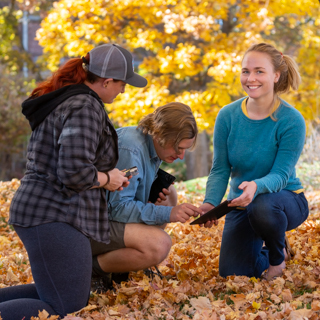Mentoring Tips
Whether a student is working as a research assistant or completing their own project, setting clear expectations around responsibilities, schedules, and communication will remove some of the most common pain points for mentor-mentee relationships.
Things to discuss:
- How long will the project take and how many hours a week will the student plan to work?
- What are the specific objectives for the project?
- How often will the mentor and mentee meet?
- How should the student prepare for meetings or follow up after meetings?
- What role will the mentor play in reviewing materials?
- How should the student communicate with their mentor outside of scheduled meeting times?
- Fill out an Undergraduate Research Contract at the start of a project to help set clear expectation.
Even if students are working on part of a bigger project, encourage and promote opportunities for them to see their work and themselves in the broader context.
- Explain the broader context and background of the project and its relevance.
- Talk about how their piece of the project will fit into the broader scope of your project.
- Have students review key articles, books, or other resources that led to the current study (include at least part of this time in their work or course hours) and set aside time to talk with their thoughts and ideas.
- Look for networking opportunities based on student interests. These could include joining your lab group, participating in a department seminar, attending a conference or meeting with you, or participating in a networking event.
- Talk with your mentee about their career and other goals – what skills or experiences would be useful to add to their project?
Most students will have limited experiences with research or creative scholarship, and many will benefit from mentorship around project management, research best practices, and research realities.
- For student-initiated projects, explain what makes a good project proposal and review materials before the student starts working. Plan to talk through students the necessary steps, budget, and time requirements – is their project too ambitious? Not ambitious enough?
- Make a timeline with milestones and deliverables. Talk through the resources, skills, and methods to meet each one.
- Teach the skills and techniques needed for research or scholarship in your field. Don’t assume students know how to do things, and build in time to check back in, review their work, and answer questions.
- Explain that setbacks are a normal part of the research process and talk through learning from failures, and model how to learn and move forward.
- Set clear expectations for high standards of research ethics, professional behavior, and accepting responsibility.
The ultimate goal is for students to become confident, independent researchers and scholars.
- Are there opportunities for the student to take on a role with greater responsibility in the project?
- Given the skills the student already has, the timeline for the project, and their career goals, what level of independence is reasonable for them to achieve?
- Give students the opportunity to solve problems on their own before they come to you, and discuss options for moving forward together before you give advice.
- Provide constructive feedback on their work.
Mentorship is about passing on skills and knowledge, but it also a personal relationship. You need to trust your mentee to do their work, and they also need to trust you to bring forward their concerns, problems, and questions.
- Let the student know you make them a priority by giving them your undivided attention during meetings, suggesting alternative times to talk if needed, reviewing their materials, and following through on what you said you would do.
- Encourage your mentee to give you feedback on how you are doing as a mentor.
- Listen to what your mentee is saying, including when they are looking to you for psychosocial support.
- Share information about your own career choices, and professional challenges and weaknesses to the extent you feel comfortable.
- Take responsibility for your role as a mentor and let the student know when you made a mistake.
- Ten salient practices for effective mentoring from the Center for Engaged Learning
- Mentoring Undergraduate Research Handbook from Georgia University
- Advisor, Teacher, Role Model, Friend (full text available) from National Academies Press
- Building Trust with a Mentee from the American Physical Society
